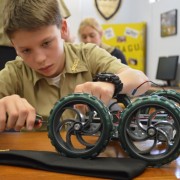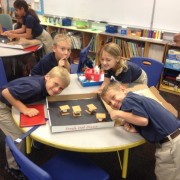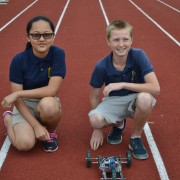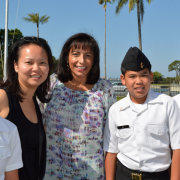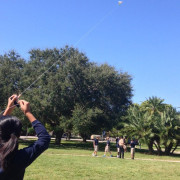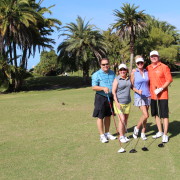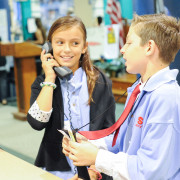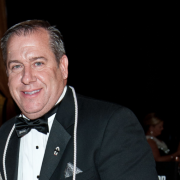Farragut students find their voice at the ROCS conference
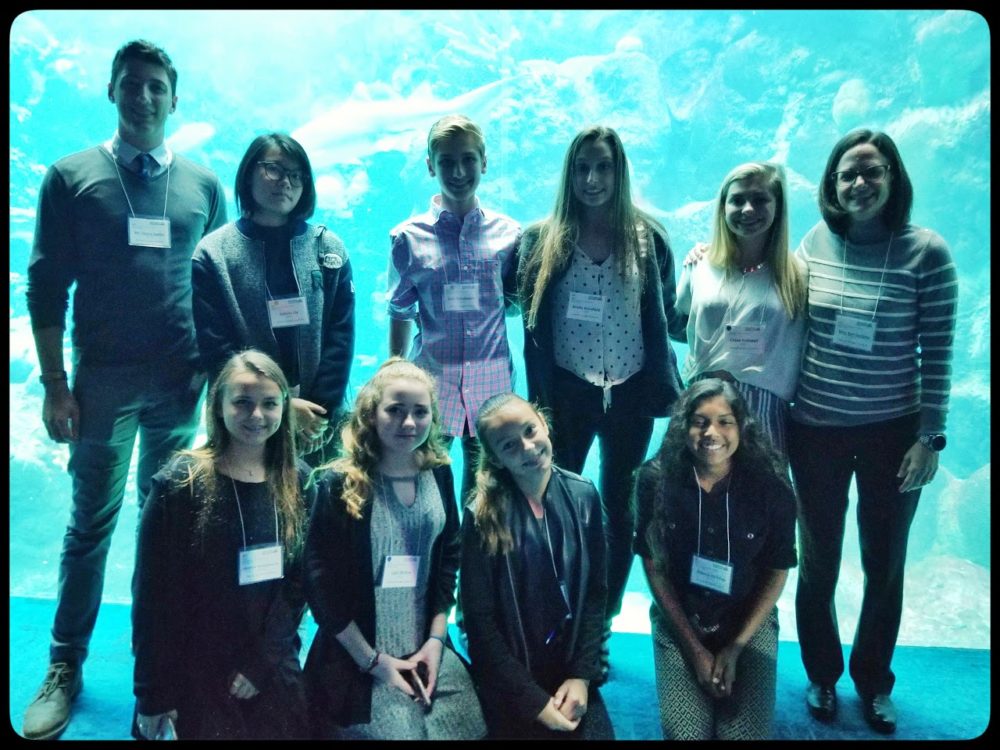
On Thursday, January 25th, Science Department Chair and Upper School Marine Science and Biology teacher Sari Deitche, along with 4th-7th Grade Science & Marine Science teacher Henry Sadler, took a group of eight students from the Upper and Lower Schools to the Regional Ocean Conference for Students (ROCS) Conference at the Florida Aquarium.
While this was Mr. Sadler’s first year, it was Mrs. Deitche’s 13th time attending as a Farragut teacher, and she has also been a guest scientist in the past when she was working for Tampa Bay Watch.
The theme of this year’s conference was “My Story, Creating Change in Tampa Bay”. Each student was required to write an essay about their conservation story and how they attempted to make a positive environmental difference in their lives. Out of the essays in each teacher’s class, eight students were chosen; 7th graders Jillian Aprile, Calli McKee, Jack Sokolowski, and Madison Hollingsworth, Brielle Benefield ‘20, Ashley Liu ‘18, Bianca DeSilva ‘20, and Chloe Fretwell ‘18.
During the conference, they listened to stories and keynotes, had a discussion on extreme weather events, and participated in activities in which the students learned how to speak to an audience and get their message across so they may be heard. One favorite activity of both the students and Mr. Sadler and Mrs. Deitche was the Improv class, in which they engaged in three twenty minute activities that focus on creativity and finding their voice.
“The students enjoyed the improv activities and learning how to overcome any anxiety of speaking to an audience,” Mrs. Deitche said. “I personally think this was a great exercise for our students as they are preparing for college and job interviews and they need to learn these people-to-people skills.”
“The improv was my favorite, especially since I want to be an actor,” said Calli.
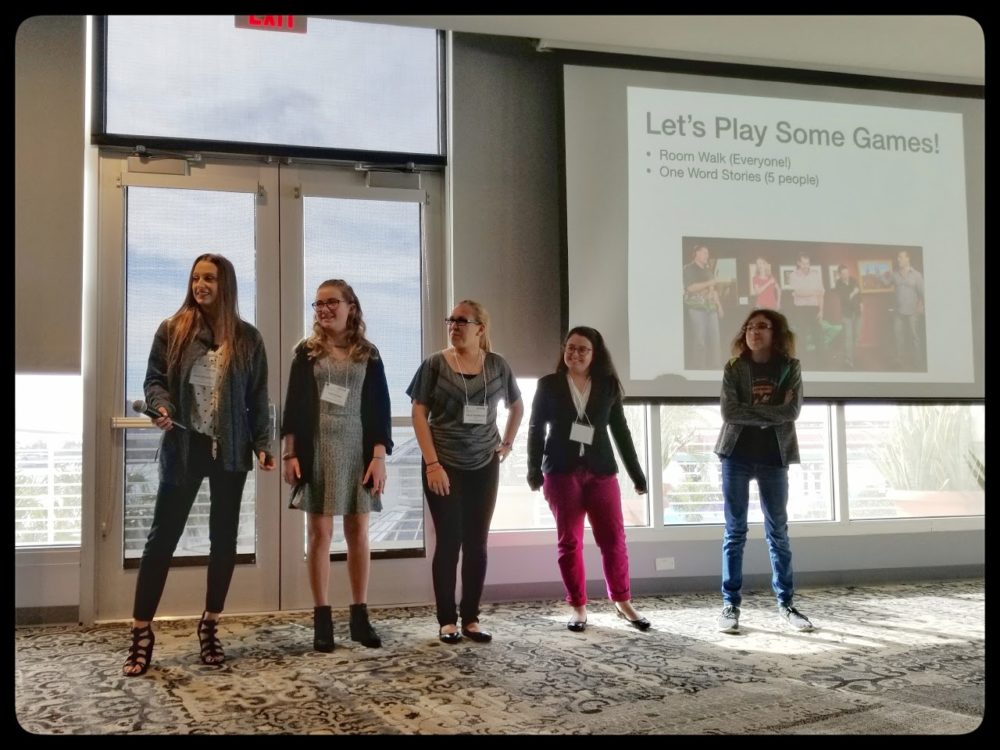
Another favorite was the talk about coral by Keynote speaker Keri O’Neil, The Florida Aquarium’s Coral Nursery Manager.
“It was really interesting to listen to her,” said Chloe. “She travels all over the place. She just got back from Australia and she got some of the coral from the reef, and she’s raising it here. It’s funny because nobody ever says that baby coral is cute, but it is!”
“It was cool to meet so many other people who want to help the environment from other countries,” said Ashley, who is an international student from China. “At our table, we had people from places like England and Africa!”
“It was great to hear the ideas of all the other students there for helping the environment,” Chloe added. “One guy takes used tennis balls and sends them to a facility that uses them to create tennis courts for disabled people. It was really cool.”
After the conference, the students were taken on a behind-the-scenes tour of the Florida Aquarium. They were able to see the inside of the Otter crossing station, and Mr. Sadler even said that a Spoonbill flew at them!
“That part was my favorite,” said Jack.

“The students had a great time,” said Mr. Sadler. “I even overheard them talking to their friends about the conference after the fact, and a couple of them said they want to go next year. Overall, I think it was a success.”
Students discuss their essays
“I thought I knew about all the plastics in the ocean,” said Chloe. “But when we learned about microplastics, stuff like the little beads in personal care products, as well as the plastics in nylon and polyester clothing, I was shocked. I’ve changed the kind of face wash, body wash, and toothpaste that I use. It might not be an epiphany or a gargantuan change, but it’s still a change. Anything that you can do, no matter the significance of it, can make a difference.”
“We have a lot of pollution in China, where I’m from,” said Ashley, who is an international student. “People sometimes have to cover their noses and mouths when they leave the house, it’s so bad. When I learned that our daily life causes such a big problem to the environment, I knew I had to make changes. The first thing I did was reconsider my mode of transportation. Automobile manufacturing, the manufacture of fuels, and the gases released by the burning of fuels cause pollution. It may not be realistic to give up a car altogether, especially in the city, but I still try my best to avoid using a car. I’ve started choosing public transportation a lot of the time. Also, saving energy will help save our environment. Even trivial things like turning lights off in unused rooms and not having a phone charger plugged in all day are very important for reducing air pollution because the electricity consumed by lights and appliances is generated by the power generation of coal or gas plants.”
“I grew up and still live on a bayou where it is normal to see trash littering the mangroves and water,” said Jack. “People just don’t seem to understand if you throw something off your boat or dock it doesn’t just go away. If you drop it on the ground along the road, it doesn’t just disappear. This all floats downstream in storm drains and rivers. It ends up in places like the bayou I live on. My home. My backyard. Many animals are endangered and at risk of extinction because of human pollution. Plastic bags are a real danger to sea turtles, which are terribly endangered because they look like jellyfish which are a major food source for them. Six pack plastic rings also threaten sea turtles. They can get tangled on their flippers or necks and cause sores and death. Simply placing these things in a recycling bin helps keep our world clean and safe for every creature.”
“When I was 9 years old, I went to a summer camp at Tampa Bay Watch in Tierra Verde, Florida,” said Calli. “At this camp, we focused on the conservation of marine biology, specifically pollution. We participated in multiple beach cleanups and planted seagrass. Participating in those cleanups and seeing all of this trash on the beaches definitely made me think about all the garbage I’ve seen before on beaches and have never really cared about. It has caused a behavior change in my everyday life. Now, instead of ignoring trash on the ground, specifically when I’m at beaches, I will pick it up and put it in either the recycling or garbage bins wherever I am. Something that the Tampa Bay Watch summer camp has taught me is that the garbage that goes into storm drains eventually finds its way into the oceans. So when you see garbage on the street, you should always pick it up while it’s not doing any harm before it can go into the oceans and potentially hurt or even kill an innocent marine animal.”

